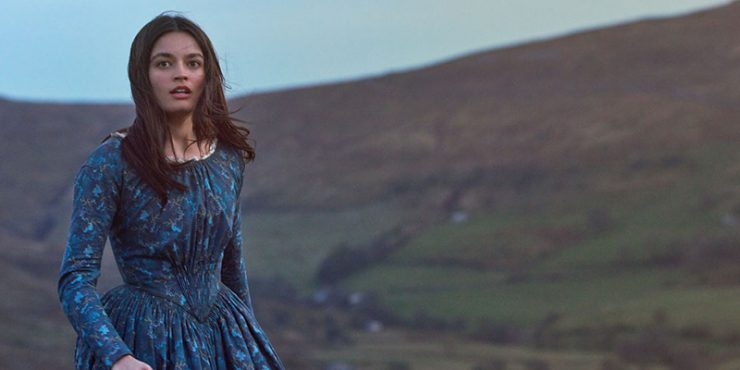The literary legacy of the Brontë sisters has sustained itself for centuries. Their novels and poetry are amongst the most well known in the world. Emily Brontë, the author of Wuthering Heights, is the most mercurial. Little is known about her outside of her intense shyness and noted reclusiveness. So writer-director Frances O’Connor is left to imagine most of Emily, a fictionalized attempt at biography, which possesses a lush visual palette and leans fully into the imaginativeness of its retelling. Wuthering Heights is a masterpiece, but it’s also a work of high drama with possessive, occasionally dishy, characters that lead you through a wandering narrative of passion and betrayal. O’Connor looks to present a life that could lead to such compelling art.
Emma Mackey plays Emily, the middle sister between the older, responsible Charlotte (Alexandra Dowling), and the younger, spirited Anne (Amelia Gething). Their brother, Branwell (Fionn Whitehead), leads a reckless life of drinking and opium use, while their father, Patrick (Adrian Dunbar), preaches haughtily from the local church, fearful of what will become of his children. The sisters and Branwell’s mother has passed, and the pious discipline of Patrick suggest the absence of a more loving figure. Caught between the measured maturity of Charlotte and the wildness of Branwell, the young Emily struggles to decide if she wants to follow in the conventional footsteps of her sister or lead a life of jaunty indulgence like her brother.
Things shift with the arrival of William Weightman (Oliver Jackson-Cohen), the new curate in Patrick’s church. His broad-chested handsomeness, along with his moral clarity, make him the romantic envy of every woman in town, with the exception of Emily, who views his high-minded preaching style with much skepticism. Emily fails at teaching – another stumble at attempting to follow in Charlotte’s footsteps – and life at home becomes aimless. She falls into trouble with Branwell, who introduces her to booze and drugs, as well as trespassing on other people’s property. Branwell’s behavior gets him sent away once again. Emily’s punishment? Mandatory French tutoring with Mr. Weightman. What begins as a taciturn battle of wills, shifts into a passionate affair, one that neither Emily or Weightman has emotional control over.
Emily tries to have equity between its strands, with Charlotte, Branwell, and Weightman each given equal time throughout the film to show their importance in Emily’s life. But that equity proves false when the love affair with Weightman arises over halfway through the film. That relationship takes up most of the narrative real estate once it’s established, and makes the familial side plots feel like first half distractions. O’Connor takes the story into dreamy, phantasmagoric alcoves which enrich the film’s otherworldliness, even if they struggle to prove their narrative importance. There is probably a better, shorter film that focuses more exclusively on the romance, but the catch is that that section of the film is its most fictional. The tension between what’s accurate and what’s fabricated helps Emily in the long run, but it does lead the film down some tedious roads.
Despite its impetuous nature, Emily does grab its audience with its striking imagery. A scene early in the film involving an almost unsettlingly stoic stage mask tells us that O’Connor is not interested in a drab English costume drama. That it leans into its fan-fiction-ness shows how much faith the first-time director has in her story. The ostentatiousness of her camera (and the histrionic nature of Abel Korzeniowski’s music score) suggests a melodrama that Emily does not always provide, but the aggressiveness of the filmmaking is welcome in this age of the bland, Hollywood blockbuster. As Emily Brontë, Mackey shows her capacity to lead a movie. Her popular work on TV’s Sex Education has eluded me, but her performance here suggests a performer of great confidence and ability. I look forward to seeing her in an even better performance.
Written and Directed by Frances O’Connor










